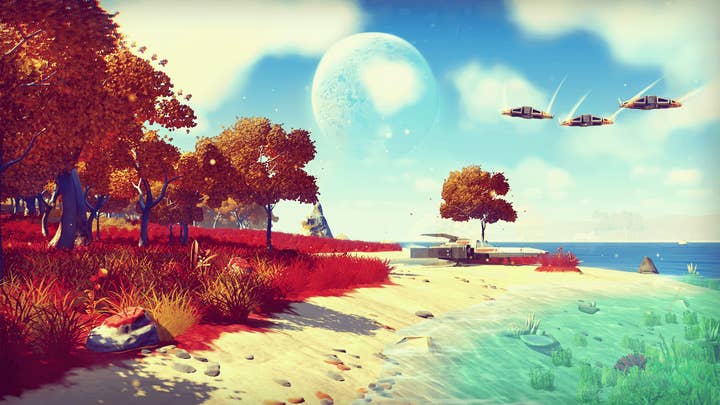Sean Murray on No Man's Sky: "I thought we were making a niche game"
Hello Games' founder on the difficulties of transforming a live game, and pushing past a divisive launch
No Man's Sky is the poster child for a shift that has occurred in games development over the past three years -- where games transform dramatically after release. Such a process is common in the mobile space, but less so on other platforms. After four major updates, Hello Games' ambitious sci-fi adventure is almost unrecognisable compared to when it was released.
At launch, No Man's Sky was an exploration adventure about reaching the centre of the universe with limited resources and little to no contact with other players. Since then, Hello Games has added base-building, creative and survival modes, dozens of hours of story content, new vehicles, permadeath options, and multiplayer. As a result, millions of players are still actively engaged in its procedurally generated universe.
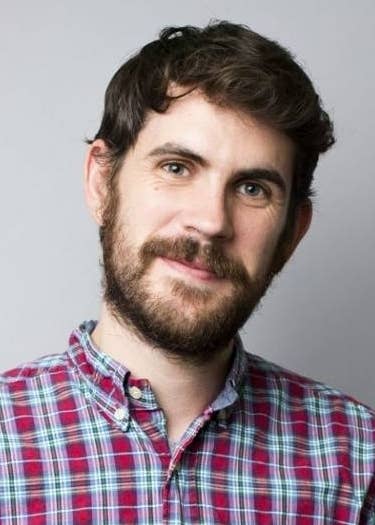
"No Man's Sky is a funny game," Hello Games founder Sean Murray tells GamesIndustry.biz. "I always underestimate how big it's going to be, thinking, 'Right, now we're entering a quiet period where the pressure eases off a bit and there are fewer people playing.'
"If we're doing an update, I'll think, 'Well, the last one did X, so this one will do half that.' I've been consistently wrong; each update we've done has been significantly bigger than the one before it. Next, particularly so. We saw the kind of numbers that a AAA game would be happy with at launch. It was very successful for us, and the player base has stayed strong."
And Hello Games isn't stopping there -- more multiplayer options and even virtual reality support is being added with this year's Beyond update. Murray admits the team is "a bit bad and a bit broken, because we can't help ourselves." Murray had speculated that Beyond might finally indicate diminishing interest in No Man's Sky, but he says the level of excitement among the community seems to be higher than it was for Next.
"Who knows? Maybe I'll be proved wrong again," he says. "I'm still waiting for that quiet period."
The fact that Hello Games still wants to add new features even three years after release is a testament to its passion for No Man's Sky. However, Murray says the studio has "definitely been tested on that."
"Each update we've done has been significantly bigger than the one before it... We saw the kind of numbers that a AAA game would be happy with at launch"
"It would have been very easy, given the commercial success of the game and the strength of the reaction around launch, to basically do anything else," he says. "But the team here were hungry to keep working on it. I don't think it was every really that much of a question.
"For a lot of us, this is the kind of game we've always wanted to make. I know that's the sort of thing a lot of developers say, but I think you can tell [it's true] with us. The design document reads like it's been written by a child: 'You can go anywhere, do anything, explore outer space and be an astronaut.' It's hard not to be won over by that. It's also really easy to see things you could add -- if we were making a first-person shooter with ten levels, maybe we wouldn't be that excited about adding an eleventh."
The excitement from a consistently active community is also a big motivator, with Murray adding that it's easier to be excited about releasing an update when millions of players are waiting for it. The updates have even led to surges of new players, and Hello Games has developed a connection between the studio and its audience. Murray says the team often looks through community discussions -- on the game's Reddit and other forums -- and notices a number of common interests that go beyond No Man's Sky, which makes it easier to know what will appeal to its players.
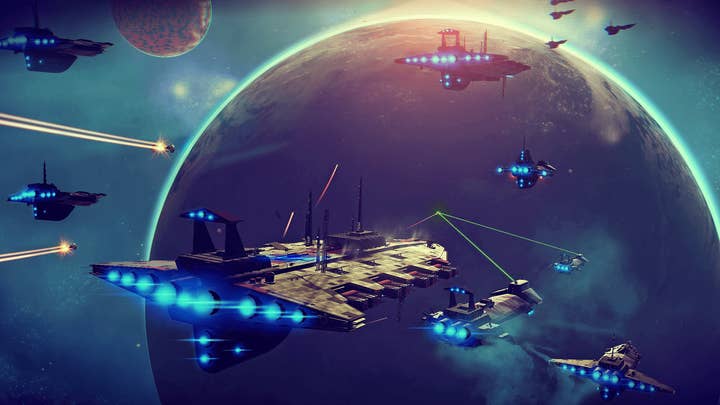
"When you're working on something for five years, it's really easy to lose sight of who you make games for, so it's quite nice to be in this period," Murray says. "I don't want to be at this stage forever, but it's a period I will look forward to when working on a future game."
But why build all these new features and ideas into the original game? Even Nintendo has said it had so many DLC ideas for Zelda: Breath of the Wild it decided to make a sequel instead. For Murray, it comes down to his preference of working on new things rather than sequels -- a mindset he developed while working at Criterion.
"We did Burnout, and then Burnout after Burnout," he recalls. "While that was fun, it was just never as fun as the first one we worked on where it felt a lot more blue sky and the game could be anything. And making games is really hard. Making Burnout 4 was just as hard as making Burnout 3, even though it shouldn't be. If you're going to work hard, it's more exciting to do something innovative and new.
"Making Burnout 4 was just as hard as making Burnout 3, even though it shouldn't be. If you're going to work hard, it's more exciting to do something innovative and new"
"Updating No Man's Sky allows us to focus just on what's new, rather than trying to revisit the whole of the game and do it with slightly different characters, ships and environments. It's fun to look at what features we don't support right now and just go after that... When we move on to new games it makes sense to focus on stuff that's big, silly and ambitious, because that's what gets us out of bed in the morning."
Of course, it's impossible to tell the story of No Man's Sky without looking at the negativity around its release. While Murray reports the game engaged a lot of people -- with early players spending an average of 25 hours in Hello Games' universe, some as many as 100 -- the narrative around its launch was one of disappointment and unmet expectations.
The updates have gone some way to addressing this; as mentioned, the game is dramatically different to its initial form and has a much broader appeal. But Murray and his team learned some hard lessons about managing (or at least appreciating) player expectations over the past three years.
"As a naïve studio, we definitely got excited about our game, people got excited, and we talked about it way too early," Murray says. "When you're an indie studio working hard to survive, the one thing that doesn't cross your mind is, 'People are too excited about my game.' We are in the lucky position where we can be more cautious in future, and we will be. We will be much more understanding of the difference between talking excitedly about your game and marketing it, which is never something we'd ever really done before.
"We knew it was going to be polarising, we knew that wasn't going to be an experience for everyone. When we released No Man's Sky -- and, in fact, when we first started talking about it -- I thought we were making a pretty niche game, and I continued to think that for a long time. A lot of the design decisions we made were for a niche game. It turned out to be a really large niche."
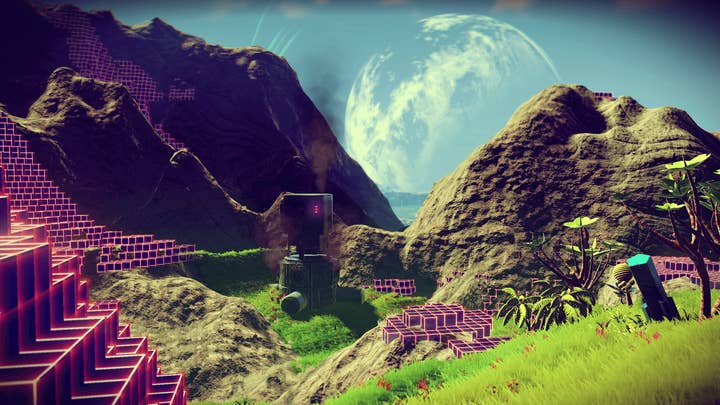
It's a situation in which many developers -- even AAA developers -- have found themselves in recent years, particularly as more games are designed with the intention of expanding and transforming long after launch. Most notably, Bethesda encountered this with Fallout 76; despite repeatedly stressing that the experience would evolve over time, it was met with widespread negativity at launch. This was partly down to quality issues, but the mismatch between player expectations and what developers actually deliver is increasingly a factor when launching a long-tail product.
"There is way too much emphasis on day one sales, and far less on what the long-term impact of these games are and what the plans for them are"
Murray notes that more games awards are adding categories like Most Evolved Game or Best Ongoing Game, for which No Man's Sky Next has received multiple nominations. Also in the running have been the likes of Rainbow Six: Siege, Fortnite, Sea of Thieves and Warframe -- "All games that had maybe a lukewarm launch or were announced dead on arrival."
"I think there is way too much emphasis from all of us as an industry on day one sales and the heat of the community reaction, and far less on what the long-term impact of these games are and what the plans for them are," Murray says. "We want as an industry to do crazy, silly, ambitious things. Sure, we're critical of things that come out and we're not happy when it's fair to not be happy, when things aren't what we wanted them to be, but we also need to have that patience with ambitious things, and to support them because that's what we want from the industry."
Murray remembers speaking to fellow studio heads and other industry peers after No Man's Sky triggered such an intense reaction at launch, asking for other examples he could learn from in how to handle it. But such precursors were few and far between, mostly involving things like networking problems that could be resolved a week later. Some of the studios affected also had the benefit of team sizes in the hundreds; Hello Games, on average, only had six people working on No Man's Sky, peaking at around 15 by launch.
"I think we were right on the cusp -- and this was only three years ago -- of that really intense, polarising reaction that is seen commonly now," says Murray. "It feels like there's a game every three months that will have that. I don't know that we now have the rules on how to deal with that, but it's really nice that people will reference us as that kind of benchmark.
"I think we were right on the cusp of that really intense, polarising reaction that is seen commonly now"
"When I set up Hello Games, I always dreamed of being mentioned in the same sentence as Bethesda. This is not exactly the circumstances I wanted that to happen in, but I'll take it. I'll always delight in someone asking how Bethesda can learn from Hello Games."
The developer did have an advantage in that it was supported by a platform holder, although Murray stresses that Hello Games has always been an independent studio and No Man's Sky was a self-funded project. Sony's support lay in distribution and communication, and the weight of the PlayStation brand helped put the game on the map -- a factor when it came to not only attracting the amount of people who would later debate whether No Man's Sky lived up to its promises, but also achieving the success it did at launch and in the years after.
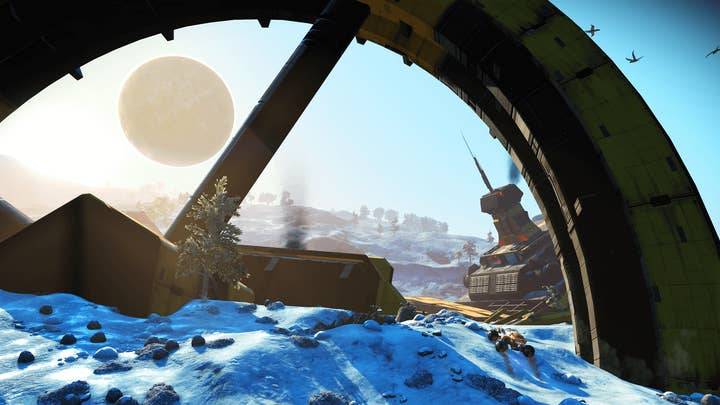
"Sony have been amazing to work with in loads of different ways, but they've also been hard to work with in loads of different ways -- all the ways you might expect when a big company is working with a very small group of people," says Murray. "I'm sure we've been hard to work with at times, too. But we are very much independent, so anything we've done has been off our own back.
"We have been lucky and privileged enough to have made one of the best-selling new IPs of recent history, of the current generation of consoles, and to achieve that in year one but also see high numbers in years two and three. It's a pretty unique situation to put out an update and have a few million people playing it on the day it releases. That's nice, and I would never take that for granted, but it's been hard fought for as well."
Murray will be sharing more about Hello Games and No Man's Sky as the opening keynote of Develop:Brighton 2019. He will be discussing the story behind its original development and the transformative updates, as well as hinting at the future of both the game and studio.
Hello Games has already announced it's working on a smaller title, The Last Campfire -- a passion project by a couple of team members -- and Murray tells us the studio is already "starting a new and ambitious project," although unsurprisingly is unable to share more details. But what of No Man's Sky? How much more is there to add?
"We're in a nice position now, and I think this is the happiest the team has been," says Murray. "Beyond is on the horizon for us, we're working very hard on that at the moment. After that, I think we'll continue to update No Man's Sky. But a thing I've learnt is, I never like making promises when I don't have to. We'll see, right? As long as people are interested and playing it, it's something that the team here is passionate about. We'll only do it while we think there are fun and interesting things to add."
GamesIndustry.biz is a media partner for Develop:Brighton 2019 and will be attending with the assistance of the organisers.
